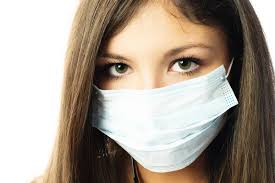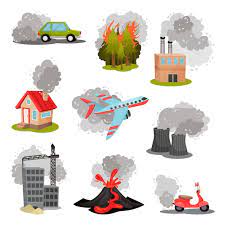20 Tips To Protect You From Air Pollution
Note: Friends, if you are comfortable in reading this article in any other language, please change the language from the translate button on the top of this article.
 |
| Air pollution can lead to a variety of health problems, including respiratory issues, heart disease, and cancer |
Friends, air pollution is a serious problem that affects the health and well-being of millions of people worldwide.
It can lead to a variety of health problems, including respiratory issues, heart disease, and cancer.
To protect yourself from air pollution, there are several steps you can take.
You can help protect yourself and your loved ones from the harmful effects of air pollution by taking the following steps.
1. Stay informed:
Keep up-to-date on the air quality in your area by checking local air quality reports or downloading an air quality app.
2. Limit outdoor activities:
When air quality is poor, try to limit your time spent outside, especially during rush hour or in heavily polluted areas.
3. Use air filters/purifiers:
 |
| Air filters in your home and office help remove pollutants from the air |
Use air filters in your home and office to help remove pollutants from the air.
4. Wear a mask:
 |
| Face mask protects your lungs from harmful particles. |
If you must be outside during periods of poor air quality, consider wearing a mask to protect your lungs from harmful particles.
5. Keep your car in good condition:
Make sure your car is in good working condition and avoid idling your engine so that it doesn't produce much pollution.
6. Support clean and renewable energy sources:
 |
| We should support clean energy sources such as wind and solar power to protect ourselves from air pollution |
Support efforts to reduce pollution by supporting clean energy sources such as wind and solar power. You can use solar panels to produce electricity for your domestic use.
7. Plant more trees:
 |
| Plant more trees, they absorb pollutants and release oxygen which is good for the environment and human health |
Trees absorb pollutants and release oxygen which is good for the environment and human health. Join organizations that are working in this field.
8. Avoid burning wood or other materials:
Burning wood, charcoal, or other materials releases particulate matter and other pollutants into the air. If you have a fireplace, use an electric or gas insert instead.
9. Keep your home and office clean:
Dust, mold, and other indoor pollutants can contribute to poor air quality. Regularly clean and maintain your living and workspaces.
10. Eat a healthy diet:
Eating a diet rich in fruits and vegetables can help boost your immune system, making it better able to fight off the effects of air pollution.
11. Support public transportation:
Using public transportation can help reduce the number of cars on the road, leading to less pollution.
12. Use natural or green cleaning products:
Many cleaning products contain harmful chemicals that can contribute to indoor air pollution. Switch to natural or green alternatives.
13. Support green spaces:
 |
| Parks, gardens, and other green spaces can help filter pollutants from the air |
Parks, gardens, and other green spaces can help filter pollutants from the air and provide a natural respite from the urban environment.
14. Support clean air policies:
Advocacy is an important aspect of protecting yourself and others from air pollution. Support policies that promote clean air and hold polluters accountable.
15. Educate yourself on the sources of air pollution:
 |
| Some common sources of air pollution include industrial facilities, power plants, and transportation |
Understanding the sources of air pollution in your area is important in order to take appropriate steps to limit your exposure. Some common sources of air pollution include industrial facilities, power plants, and transportation.
16. Make your voice heard:
Use your voice to advocate for clean air policies. Contact your elected representatives and let them know that clean air is important to you.
17. Support organizations working to reduce air pollution:
There are many organizations working to reduce air pollution and improve air quality. Consider supporting these organizations through donations, volunteering, or other means.
18. Support green business:
Supporting businesses that prioritize sustainability and clean air can help promote a culture of environmental responsibility.
19. Avoid products that contribute to air pollution:
Some products, such as pesticides and consumer goods made from fossil fuels, can contribute to air pollution. Avoiding these products can help reduce pollution.
20. Encourage others to take action:
Share information about air pollution and its health impacts with friends and family, and encourage them to take steps to protect themselves.
By taking steps to protect yourself and supporting efforts to reduce pollution, you can help create a cleaner, healthier environment for everyone.
It's important to note that exposure to air pollution can be especially harmful to certain groups such as children, older adults, and people with pre-existing health conditions.
If you or someone you know falls into one of these categories, it's especially important to take steps to protect yourself from air pollution.
Please see the above video for reference.
- Senior citizens have low immunity and are more prone to health problems caused by pollution.
- Polluted air contains Ozone, Nitrogen Peroxide, Carbon Monoxide, and Sulphur Dioxide.
- It also contains Particulate Matter, Volatile Organic Compounds, and Heavy Metals.
- In elderly people pollution easily damages the Lungs, Heart, Brain blood, Eyes, and Nose.
- In India child male: female is 100:94 while at the age of 80, it becomes 100:180.
- One reason for this being males involve themselves in outdoor activities for fitness.
- Avoid stepping out in the foggy early morning and late evening in foggy or smoggy days and use a mask when necessary.
- Install an air purifier at home to avoid indoor dust.
- Get Carpets, Curtains, sofas and other dust catchers cleaned regularly.
- Avoid passive smoking as far as possible, it is more dangerous than smoke.
- Keep potted plants inside the house to reduce indoor pollution.
- Keep the windows of your car up and keep the car AC in a closed circuit.
- Minimize the use of plastic utensils and opt for glass or steel.
- Perform the Kunjal Kriya regularly to cleanse the body internally.
In conclusion, protecting yourself from air pollution is a multi-faceted process that involves staying informed, limiting your exposure, and taking steps to reduce pollution in your own life.
By taking these steps, you can help reduce your risk of health problems caused by air pollution and improve the air quality for everyone.
However, remember that individuals can do only so much, so it is important to advocate for policies and regulations that will reduce air pollution at the community and government levels.
Q. What is air pollution and what causes it?
A. Air pollution refers to the presence of harmful substances in the air we breathe. It can be caused by human activities such as burning fossil fuels and industrial processes, as well as natural sources such as wildfires and volcanic eruptions.
Q. How does air pollution affect human health?
A. Long-term exposure to air pollution can lead to serious health problems such as respiratory and cardiovascular disease, cancer, and stroke. It can also aggravate existing conditions such as asthma.
Q. What are the different types of air pollution?
A. Types of air pollution include particulate matter, ozone, nitrogen oxides, sulfur dioxide, and carbon monoxide.
Q. How can individuals reduce their own air pollution emissions?
A. Individuals can reduce their own air pollution emissions by driving less, using public transportation, and reducing energy consumption at home. Planting trees and using energy-efficient appliances can also help.
Q. What are some government policies and regulations in place to address air pollution?
A. Government policies and regulations to address air pollution include the Clean Air Act, the Clean Power Plan, and the National Ambient Air Quality Standards.
Q. How can communities and cities work to reduce air pollution?
A. Communities and cities can work to reduce air pollution by promoting clean transportation options, supporting renewable energy, and implementing green infrastructure.
Q. What are some technologies and methods used to monitor and reduce air pollution?
A. Communities and cities can work to reduce air pollution by promoting clean transportation options, supporting renewable energy, and implementing green infrastructure.
Q. How does air pollution impact the environment and wildlife?
A. Wildlife can be poisoned by air pollutants through disruption of endocrine function, organ damage, increased susceptibility to stresses and illnesses, decreased reproductive success, and even death.
Q. How does climate change relate to air pollution?
A. Allergens and dangerous air contaminants rise when the temperature rises. For example, longer warm seasons can also mean longer pollen seasons, which may result in more allergic reactions and asthma attacks which reduces the potential to be productive at work or at school.
Q. What are some international efforts to address air pollution?
A. Technologies and methods used to monitor and reduce air pollution include air quality monitoring stations, emissions control equipment, and regulations on industrial emissions.

Comments
Post a Comment